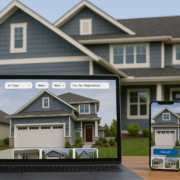Top Marketing Strategies for Real Estate Agents
Picture this: You’ve got a beautiful new listing, but despite your best efforts, no one’s calling.
The market feels crowded, buyers are distracted, and it seems like every other agent has a bigger online presence than you. The truth is, in today’s real estate world, success isn’t just about having the right property; it’s about knowing how to market it (and yourself) so you stand out.
In this guide, we’ll explore proven marketing strategies that help real estate agents cut through the noise and close more deals. From harnessing the power of social media to optimizing your website for local searches, you’ll find practical, actionable tips you can start using today to attract more clients and boost your sales.
Action Takeaways
- Use social media platforms effectively to engage audiences, showcase properties, and build trust through consistent content and targeted advertising campaigns.
- Optimize your real estate website by focusing on SEO, providing valuable resources, and integrating IDX listings to enhance user experience and attract clients.
- Use personalized email marketing and nurture leads through segmented campaigns, educational webinars, and virtual events to strengthen client relationships and drive sales.
How to Grow Strategically
Now that you know the big picture, let’s dig into the practical steps you can take to grow your real estate business with intention.
The strategies below focus on proven, repeatable actions that help you attract qualified leads, build stronger client relationships, and position yourself as the go-to agent in your market.
Leverage Social Media Marketing
Social media platforms are indispensable tools for real estate agents. Top-performing agents who consistently engage their audiences on social media channels see significant benefits.
Creating thoughtful LinkedIn articles, using video content, and engaging in live interactions on Instagram and Facebook allows agents to effectively showcase their properties and expertise.
Moreover, utilizing geo-filters can increase engagement and brand awareness among users in specific areas. Interacting with your audience by responding to comments and questions fosters a sense of community and builds trust.
Specific strategies can maximize the benefits of social media marketing for real estate agents using effective real estate marketing ideas and real estate marketing strategies.
How to Create Engaging Social Media Posts
To make your social media content stand out, start by highlighting key property features using high-quality photos and videos. Focus on details that matter to buyers—like natural light, updated kitchens, or unique layouts—and ensure your visuals are well-lit and professional.
Use AI-powered tools like Visme to design infographics that share property stats, neighborhood highlights, or local market trends. These can make your posts more shareable and help position you as a knowledgeable resource.
Incorporate interactive tactics such as contests or giveaways to boost engagement and grow your audience. Pair these with posts about personal milestones or professional wins to add authenticity and make your brand more relatable.
Finally, take advantage of Instagram Stories and Reels to showcase listings, behind-the-scenes moments, and community events. These short-form videos keep your content dynamic and give followers a reason to keep checking back.
Run Targeted Advertising Campaigns
Targeted advertising campaigns are a cornerstone of any successful real estate marketing strategy. By focusing your message on the right audience, you can connect with potential buyers and sellers more efficiently—and with a higher return on your investment.
Online advertising platforms such as YouTube, the Zillow Premier Agent program, Facebook ads, Google AdWords, and Meta’s Advantage+ for Facebook and Instagram make it possible to reach your specific target market with precision. These tools allow you to tailor your campaigns based on location, demographics, interests, and behaviors, ensuring your ads are seen by the people most likely to take action.
Start by clearly defining your target audience. Identify the potential buyers and sellers you can best serve, then craft paid advertising content that speaks directly to their needs. Effective targeting can be refined based on factors such as:
- Age
- Gender
- Region
- Interests
Pro Tip: Researching factors like location, amenities, and commute time can help you better define your market and create captivating graphics that stand out.
Good advertisements include visual elements like custom photos or videos, clear value propositions, and calls to action. Using a unique selling proposition and unique phone numbers assigned to each advertisement can help track their performance effectively.
You can also maximize ad potential by using a unique value proposition and a mix of strategies, continuously measuring results to track success.
Prioritize Entertaining Video Content
Video content has become an essential part of real estate marketing. Listing videos provide an in-depth view of properties, generating interest and helping prospects see exactly what each property offers. Educational videos can establish credibility and demonstrate expertise to potential clients, making them an effective tool for real estate agents.
Explainer videos can help differentiate real estate agencies from competitors by communicating their value propositions. To effectively promote videos, use social media platforms like Facebook, Instagram, and Twitter to reach a wider audience. Short educational videos are particularly effective on platforms like Instagram and Facebook for enhancing marketing efforts.
Additionally, long neighborhood tour videos on YouTube can be beneficial for boosting watch time and showcasing the local community, leading to more traffic.

Optimize Your Real Estate Website
A professional and well-structured website is crucial when you want to build a strong online presence in the real estate business. Key factors to consider include:
- Optimizing your real estate website for local keywords
- Ensuring the website is mobile-friendly
- Providing fast navigation to improve user experience and search rankings
- Using quality and high-quality images to attract home buyers and enhance the overall appeal of property listings.
Marketing Tools Tip: Adding a live chat plugin to your website is an easy way to connect with visitors in real time, answer their questions, and capture new leads while they’re still interested. Pair that with a website that’s easy to navigate and packed with helpful resources, and you’ll give potential clients a reason to stick around—and a reason to choose you when they’re ready to make a move.
Follow SEO Best Practices
SEO (search engine optimization) is what improves website and blog visibility in search engine optimization results. In other words, it’s crucial for attracting organic traffic.
How to Boost Your Real Estate SEO Potential
- Know why SEO matters – It improves your site’s visibility in search results, helping potential clients find you organically.
- Publish content consistently – Regular blog posts, property pages, and resources keep traffic flowing and show search engines your site is active. Don’t underestimate the value of professional marketing materials that are also optimized for SEO.
- Do keyword research – Find terms competitors rank for and target both buyers and sellers in your strategy.
- Optimize for local SEO – Use local keywords on listings, format addresses correctly, add relevant links, and earn local backlinks to boost domain authority.
- Leverage reviews – Positive reviews improve credibility and can directly lift your local search rankings.
- Enhance multimedia – Use high-quality local photos and optimize videos (titles, tags, descriptions) to increase SEO potential.
Offer Valuable Resources
Providing valuable resources on your website can significantly enhance user engagement. Tools like home valuation calculators and mortgage calculators are highly beneficial for users. Integrating a home valuation tool on your website allows users to easily assess their property value, improving visitor retention.
Creating downloadable guides for buyers and sellers can greatly enhance user engagement and position you as a knowledgeable resource in the market. Using tools like ‘Answer The Public’ can help identify common questions your target market is asking, guiding valuable blog content creation.
Integrate IDX Listings
Incorporating IDX functionality allows users to search for properties directly on your website, streamlining their experience and keeping them engaged.
Pro Tip: With iHomefinder Max, you can integrate powerful IDX search tools that not only display live MLS listings but also offer advanced filters, map-based searches, and saved search alerts. This keeps potential buyers on your site longer and gives them a reason to return—boosting both engagement and lead capture.
Capitalize on Email Marketing for Lead Nurturing
Email marketing is a powerful tool for maintaining contact with your client database and nurturing leads. A well-crafted digital marketing strategy helps keep your clients informed and engaged, ultimately leading to more successful transactions. Your email marketing campaigns should include:
- A call to action
- Interesting content
- Local market knowledge
- Shout-outs to local businesses
- Visuals to capture your audience’s attention.
Advertising listings in a dedicated newsletter with brief messages, appealing subject lines, striking photos, and links can effectively showcase properties. Suggested content for email newsletters includes:
- Hyper-local market reports
- Home valuation updates
- Quirky listings
- Restaurant reviews
Personalized emails with recipient names, tailored property suggestions, and personalized follow-ups deepen trust and make emails feel more personal.
Segmenting Email Campaigns
One of the easiest ways to make your email marketing more effective is by segmenting your list—grouping subscribers based on factors like location, buying stage, or property preferences. This allows you to send messages that are truly relevant to each audience, rather than a one-size-fits-all blast.
Personalization pays off: segmented email campaigns can generate up to 760% more revenue than non-segmented campaigns. To increase open rates, keep subject lines short, specific, and compelling—especially since many recipients mark emails as spam based solely on the subject line.
Drip Campaigns
A drip campaign is a series of automated emails that keeps you in touch with leads over time—without the need to manually send each message. The best drip email tools let you automatically segment subscribers and trigger emails based on their actions, so every message feels timely and relevant.
The key is to focus on delivering value rather than just pitching your services. Drip campaigns can generate more clicksthan standard email blasts, making them a powerful part of your real estate marketing strategy.
For an even bigger impact, include videos in your follow-up sequences. Short property tours, market updates, or community spotlights can help subscribers feel more connected to both you and the area. New subscribers should get these videos as part of a welcome drip series, alongside your written content.
Personalized Communication
Including tailored property suggestions in emails can strengthen connections with clients. Personalizing email messages by including properties relevant to the client’s current area or desired location enhances engagement. Personalized communication is crucial in real estate marketing, as it helps build stronger connections with clients.
Effective personalized communication in real estate can lead to stronger client relationships and increased success rates through customer relationship management and real estate expertise.
Claim and Optimize Google My Business
An optimized Google Business Profile is essential for improving visibility in local search results. Create and optimize your Google Business profile to manage how your business appears in Google Search and Maps.
Make sure to provide accurate Name, Address, and Phone number (NAP) to enhance local search optimization.
Gather and Showcase Client Reviews
Online reviews significantly influence potential clients’ perceptions of a business, enhancing credibility. Video testimonials with photos or videos are considered more effective in influencing potential clients. Past clients act as brand ambassadors, enhancing the branding and image of your business.
Platforms like Yelp are relied upon by 44% of consumers. They use these platforms to evaluate potential businesses.

Create Local Content
Producing neighborhood-specific content can position agents as local experts and attract targeted leads. Creating local content helps build a connection with the community and potential clients by showcasing relevant information. This can include content about local businesses, events, and community news, which can draw in clients who are specifically interested in those areas, thereby increasing the quality of leads.
Establishing oneself as a local expert through consistent and valuable local content can lead to long-lasting client relationships. Highlighting local events and businesses not only helps with SEO but also shows your commitment to the community, further enhancing your reputation as a trusted local real estate agent.
Host Virtual Events and Webinars
Hosting virtual events and webinars is a modern and effective way to engage with clients and showcase your expertise. These events can help build trust by allowing clients to see day-to-day operations and gain valuable information from the comfort of their homes. Utilizing platforms like Zoom and Webinarjam makes it easy to reach potential clients.
Virtual open houses, educational webinars, and live Q&A sessions are some of the formats that can be used to attract and interact with clients. Following up with attendees by using a sign-in sheet to collect information can help maintain contact and nurture more leads.
Virtual Open Houses
Virtual tours allow buyers to explore properties conveniently from home, improving the buying experience. These tours can highlight important amenities such as nearby schools and hospitals for potential buyers. Esquire Real Estate Brokerage offers virtual tours for dream mansions, making luxury properties more accessible.
The modern approach to open houses involves a virtual-first strategy, making them accessible anytime. This not only broadens the reach of your property listings but also provides a flexible viewing schedule for potential buyers who may not be able to attend in person.
Educational Webinars
Educational webinars can enhance agent credibility and provide valuable information to both potential and current clients. Topics for webinars can include first-time home buying, market trends, and investment strategies. Hosting educational webinars helps build trust and engage with your audience effectively.
Attract viewers to live social media events by scheduling and promoting them several days in advance. This ensures that more people are aware of the event and can plan to attend, increasing your reach and engagement.
Live Q&A Sessions
Live Q&A sessions provide a platform for real-time interaction with potential buyers and sellers. Real-time interaction during live sessions helps address potential clients’ questions directly, building trust and providing immediate value.
Invest in High-Quality Visuals
High-quality visuals are crucial in attracting more buyers to real estate listings. Images, charts, graphs, and other graphic elements can enhance real estate marketing, making your listings more appealing. Camera drones are increasingly used in real estate photography and videography to provide unique perspectives.
Matterport provides extra tools such as room labels. Additionally, they offer instant furnishing to help buyers gain a clearer understanding of the space. Investing in high-quality visuals can significantly boost your marketing campaigns and leave a lasting impression on potential buyers.
Professional Photography
High-quality photography is one of the most effective ways to make a strong impression on potential buyers. To capture properties in their best light:
- Use wide-angle shots to showcase spaciousness, especially in larger homes with outdoor features.
- Capture interior spaces in detail, focusing on natural light and standout features like updated kitchens or unique architectural details.
- Create and upload virtual tours or photo galleries as soon as the property is ready, ensuring your marketing goes live quickly.
Professional visuals not only boost the perceived value of a property but also strengthen your personal brand as an agent. This investment often leads to faster sales, better client reviews, and more repeat business.
3D Tours and Virtual Staging
3D tours give buyers the flexibility to explore properties on their own schedule and at their own pace. They also provide continuous, around-the-clock access to listings, which can keep a property top of mind and generate more interest.
Consider enhancing these virtual tours with interactive features, such as the ability to visualize different furniture layouts, décor styles, or renovation options. These immersive experiences help potential buyers picture themselves in the home and make your listings stand out in a competitive market.
Drone Footage
Drone photography and videography provide unique aerial views of properties and their surrounding areas. Utilizing drones allows for the capture of larger areas around properties, highlighting the entire neighborhood and providing a comprehensive view for potential buyers.
Build a Strong Referral Network
As a real estate professional, building a strong referral network is essential for enhancing your business’s sustainability and reducing the time spent on cold leads during the home buying process.
Participating in local community events generates goodwill and opens doors for potential referrals. Networking at virtual events enhances your visibility and connects you with other professionals for referrals.
Showing clients they are valued through thoughtful gestures increases loyalty and promotes a referral culture.
Partner with Local Businesses
Collaborating with local businesses allows real estate agents to enhance their real estate services and gain access to new clients through referrals. Building relationships with small businesses and financial institutions can lead to mutual referrals that benefit all parties involved. Effective outreach methods include in-person or telephone contact and utilizing platforms like LinkedIn to connect with local service business owners.
People are more likely to trust referrals from friends and family, making it essential for successful agents and other agents, as well as many agents, to cultivate a strong referral network. Partnering with local businesses not only expands your network but also strengthens your ties to the local community.
Create a Referral Program
Incentivizing referrals through a rewards system can motivate both past clients and business partners to refer new clients. Creating a referral program can help ensure a steady stream of new business and strengthen your relationship with your existing client base.
Maintain Relationships with Past Clients
Regularly celebrating milestones such as home anniversaries can reinforce relationships and encourage referrals. Regular communication through check-ins helps to keep your relationship with past clients strong and encourages repeat business. It’s also good practice to ask for client testimonials that you can use publicly as a way to drive lead generation with new connections.
Sending holiday greetings to past clients and potential client is a thoughtful way to keep in touch and show appreciation for their business. Providing updates on market trends keeps past clients informed and engaged, increasing the likelihood they will refer you to others.
Track and Analyze Your Real Estate Marketing Plan
Tracking and analyzing marketing efforts is crucial for assessing the effectiveness of your strategies. Metrics like interactions with social media posts and leads generated provide valuable insights into which marketing channels are most effective. Understanding why it is important to track marketing metrics is essential, as measurement is key for marketing success, enabling adjustments and improvements.
Analytics tools like iovox track inbound lead handling and call-response metrics, aiding in data-driven decision-making and strategy optimization. Regularly analyzing performance metrics and adjusting your marketing strategies based on data insights can significantly enhance the achievement of your business goals.
Set Key Performance Indicators (KPIs)
To measure marketing success, consider the following objectives and strategies:
- Identify clear objectives, such as generating 500 new email subscribers.
- Focus on activity goals that encourage regular marketing efforts and measurement of your progress.
- Utilize the sales conversion rate to determine how many leads are necessary to achieve a sale.
Setting KPIs helps real estate agents track their progress and make necessary adjustments to their marketing strategies. This ensures that their marketing efforts are aligned with their business goals and are effective in generating leads and sales.
Use Analytics Tools
If you’re not tracking your marketing, you’re guessing—and guessing rarely pays off. Tools like website analytics can show you how many people are visiting your site, which pages they’re checking out, and how they found you. Your CRM can help you follow leads from their first click all the way to closing.
By keeping an eye on this data, you can see what’s working, what’s not, and where to focus your time and budget. It’s the difference between throwing money at marketing and investing it where it will actually pay off.
Adjust Strategies Based on Data
Numbers point to where you should go next in your particular real estate niche, social media accounts, or broader marketing activities. When you regularly review your marketing results, you can spot trends, double down on what’s bringing in leads, and rethink what isn’t.
Real estate markets move fast, and so should your strategy so that you’re staying as visible as possible with prospective buyers and connections. The more you adapt based on solid data, the better you can target the right audience, spend smarter, and get closer to your sales goals.
Adapt, Grow, Become More Visible
Success in real estate isn’t about doing everything—it’s about doing the right things, consistently. From social media and email marketing to local SEO, virtual events, high-quality visuals, and a strong referral network, each strategy you put into play builds your visibility and credibility in the market.
The agents who thrive in 2025 will be the ones who adapt quickly, track what’s working, and refine their approach over time. And when it comes to making your website work harder for you, iHomefinder gives you the tools to attract, engage, and convert more leads with powerful IDX search, lead capture, and marketing automation.
Don’t wait for the market to come to you—take the first step toward a smarter, more strategic real estate business. Explore iHomefinder today, and turn your marketing into measurable results.
Frequently Asked Questions
How can social media marketing benefit real estate agents?
Social media marketing can significantly benefit real estate agents by generating leads and influencing purchasing decisions through engaging and interactive content. This approach helps build trust and establish a strong online presence to attract potential clients.
What are the benefits of using video content in real estate marketing?
Using video content in real estate marketing effectively showcases properties in detail, establishes credibility, and engages a broader audience, which can lead to increased interest and sales.
Why is local SEO important for real estate agents?
Local SEO is crucial for real estate agents as it enhances visibility and attracts clients specifically interested in properties within targeted neighborhoods. This focus on local searches ultimately drives more leads and increases sales opportunities.
How can email marketing nurture leads in real estate?
Email marketing can effectively nurture leads in real estate by providing personalized and segmented content, such as tailored property suggestions and engaging drip campaigns that keep clients informed and connected. This approach fosters stronger relationships and enhances the likelihood of conversion.
What tools can real estate agents use to track and analyze their marketing efforts?
Real estate agents can effectively track and analyze their marketing efforts using tools such as Google Analytics and CRM systems, which provide insights into performance and lead tracking. Utilizing these resources will help optimize their marketing strategies.





